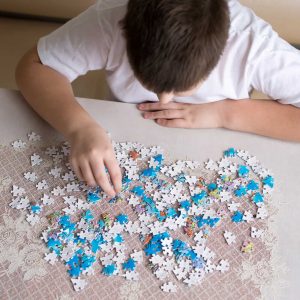What is visual perception?
Visual perception is what allows us to process what we see so that we can interpret, analyze, and give meaning to our world. People may look at the exact same visual stimulus, but have a different subjective experience. Our ability to correctly interpret what we see affects our cognitive development, learning, and many of our daily activities.
Having age-appropriate perceptual skills is critical to learning. For example, without adequate perceptual skills, we would not be able to identify an identical word on another page while reading, be able to differentiate between a “p” and a “q”, write letters in the correct sequence when spelling, be able to form a mental picture of what we’ve just read to improve reading comprehension, be able to differentiate between left and right, mentally manipulate objects in math, or be able to conceptualize relationships in science. Fortunately, perceptual skills are learned and any deficits can be successfully treated with perceptual therapy by Dr. Lisa Januskey.
What Causes Perceptual Disorders?
Perceptual disorders can be the result of a developmental delay or a traumatic brain injury.
Categories of Visual Perceptual Skills
Visual perceptual skills are categorized based on their analytical function. Subsets of these skills must operate efficiently together for efficient visual function and to facilitate learning. Below are the different subsets of visual skills:
Visual Discrimination: the ability to discriminate dominant features of objects. This includes being able to identify position, shape, form, and color.
Visual Memory: the ability to recognize one object after seeing it for just a brief interval.
Spatial Relations: the ability to perceive the positions of objects in relation to oneself and other objects. Spatial skills can be further sub-categorized into:
- Laterality Skills: an internal self-awareness of the two sides of the body and how they are different (i.e. right and left)
- Directionality Skills: how we relate the location of one object to another non-self object in space
- Bilateral Integration: the ability to effectively use both sides of the body independently or simultaneously
Form Constancy: the ability to perceive that one object is still the same object even if its size or orientation changes.
Sequential Memory: the ability to recognize a series of objects in the correct order after seeing them for a brief interval.
Visual Figure-Ground: the ability to identify an object from a complex background or from surrounding objects. Finding Waldo in the “Where’s Waldo” books is an example of having to use the visual figure-ground skill.
Visual Closure: the ability to identify a whole figure when only fragments are presented. Visual closure is what allows us to only see part of an object (which may be because its view is obstructed) and still be able to identify it correctly.




